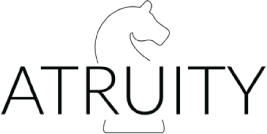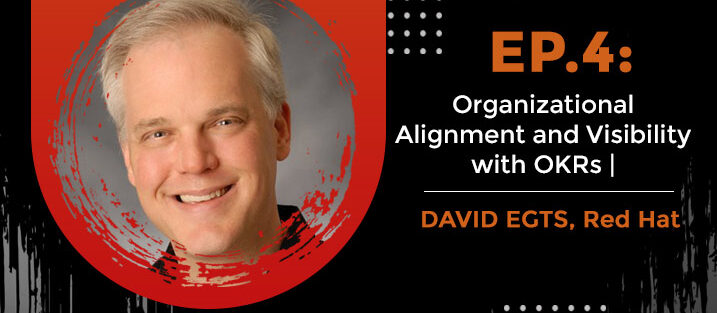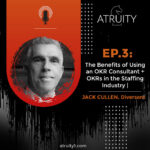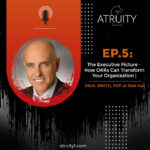In this episode of the OKR Q&A Podcast, Tim Meinhardt interviews David Egts about his perspective on OKRs and how his organization is benefitting from using OKRS. David is the Chief Technologist of Red Hat’s North America Public Sector organization where he directs a global team of technical experts and field product management to help government clients improve service delivery the open source way. The Office of Chief Technologist, which he leads, adds value to flagship Red Hat technologies such as Red Hat Enterprise Linux, OpenShift, and Linux containers. His team helps Red Hat achieve ideal product-market fit by ensuring current and future government requirements are factored into existing products and R&D efforts with a focus on security, compliance, standards, efficiency, and technological improvements.
David also co-hosts his own podcast – The Dave and Gunnar Show. For more information on his podcast, visit https://dgshow.org/. You can also find David on LinkedIn and Twitter (@davidegts).
Tim Meinhardt:
Welcome to another exciting episode of the OKRs Q&A podcast, also known as the OKR Corral where OKR insight is the king. I’m your host Tim Meinhardt, CEO of Atruity, an OKR Consultancy headquartered in our nation’s capital. Today I’m so thrilled to have the opportunity to talk with David Egts. David is a Chief Technologist of Red Hat North American Public Sector Organization, where he directs a global team of technical experts and field product managers. David received industry-wide recognition as a FedScoop 50 Industry Leadership Awardee, and a finalist for Washington Execs Chief Officer Awards. He’s a Red Hat Chairman’s Award Recipient and has won multiple highest employee honors from previous employers. Please welcome David Egts.
Tim Meinhardt:
So Dave, tell our audience a little bit about yourself, who you work for and some of your largest accomplishments.
David Egts:
Yeah. So, hey Tim, thanks for having me on the show.
Tim Meinhardt:
Sure.
David Egts:
So I’m Dave Egts, I’m the Chief Technologist of Public Sector at Red Hat. I’ve been at Red Hat for 13 years, and what I do is I lead a team of folks that work a lot with our engineering teams and our product teams to make sure our products, our open source products, are government ready. And I meet a lot with, and the team meets a lot with executives in the government, higher education, federal, state, local agencies, to figure out what their needs and challenges are and make sure that the engine of open source in the areas where we lead factor in their requirements. And accomplishment wise, probably my biggest accomplishment is having my daughter. She is very special to me. So if you google her, her name is Lauren Egts, and she’s all over the internet for a lot of the STEM work that she’s done, a lot of Raspberry Pi stuff, just a computer nerd at heart and just following in my footsteps and I love her a lot.
Tim Meinhardt:
Very cool, Dave, very cool. So changing this to OKRs, what was your initial impression of OKRs and when did you begin to kind of take a look at this for Red Hat?
David Egts:
Yeah, it was a couple of years ago. I read a lot of HBR and things like that, and I saw this book that came out called Measure What Matters. And it was written by John Doerr, he is a Kleiner Perkins now, the venture capital org, and he learned about OKRs from Andy Grove when John Doerr was a product manager at Intel. And he just really took it to heart, and then brought it into his work as he left Intel into other jobs and everything, and it’s part of the portfolio with Kleiner Perkins. And one of the small companies he was working with was a little company called Google, and they really embraced it. And it’s like I got into it and I know that my boss, who is a real mentor to me, and we’re always looking for ways to always improve. I forget which of the Toyota people that said this, but there’s no best, there’s only better.
Tim Meinhardt:
Only better.
David Egts:
How do you always continuously improve? And I told Paul Smith about the book, and I’m like, “Hey, I think if this is good enough for Andy Grove, if it’s good enough for Kleiner Perkins, if it’s good enough for Larry and Sergey at Google, we should give it a look.” And if we’re not going to do it, it’s like, why? It’s like, let’s consciously decide we don’t want to do it. And so we started looking at it and everything, but as I read it, it is one of those sort of lifestyle changes, especially in a field organization or a sales organization, because we can always get so wrapped around what is in quarter, especially when we think about sales and how people are incentivized and motivated, right? So there isn’t a whole lot of longterm thinking.
David Egts:
And when we started to get into OKRs that forced us to take a step back and say, why are we doing what we’re doing in this quarter? And where do we want to be with our longterm goals? And in order to get to our longterm goals, what do we have to do this year? And to get what we want to do this year, what do we have to do this quarter? And to figure out that roadmap. And OKRs have turned into providing that North Star there for us in terms of, what we do when we wake up every day is, for my team, it’s government ready and everybody needs to get that tattooed on them. That’s what we’re going to do.
Tim Meinhardt:
That’s right. That’s our marching orders.
David Egts:
That’s what we focus on. And I know Tim, you’ve been a real mentor with us with the OKRs too in helping us lead the charge.
Tim Meinhardt:
Thank you.
David Egts:
You have a gift for drawing the best out in people.
Tim Meinhardt:
Well thank you Dave.
David Egts:
Sessions where, especially with a lot of nerds, getting them to talk, you have a great gift for that.
Tim Meinhardt:
We have lively conversations, no doubt, with your team. And it’s always delightful to spend that hour or so pre-quarter to figure out what it is that’s most important and what are we going to accomplish the next quarter. And if we had the best quarter we ever have, what would it look like? How would we describe it if we were at the end of the quarter, having a beer or something together. And so I do get a wonderful kick out of talking with your folks. Let’s talk a little bit about challenges for a second, Dave. Tell me if you could, and tell our audience, about what you found to be the biggest challenge with OKRs in your particular organization.
David Egts:
I think challenge wise it’s unplanned work for a lot of people, right? Oh, there’s more work I got to do. Or is this the flavor of the month? Dave read a book again, or Paul read a book, and it’s like, here’s a new thing we’re going to do. And getting everybody on board with it is really important. And having someone external, like you Tim, really helped us, instead of like, well, let’s just run the clock out, let it fail and or wait until Dave gets another book and then he’ll get all hyped up on that. But the thing there is getting that alignment and making it a lifestyle instead of a passing fad. Getting everybody bought in and seeing the results is important too. I think a lot of it too is hearing from the troops, the rank and file, seeing them really embrace it. And I know you’ve seen that throughout our organization of it’s not just the managers embracing it, the individual contributors. It’s like, oh, here’s my piece of this.
David Egts:
And as I think, especially now about COVID and everybody’s sheltering in place, they’re working from home, it’s really hard to have a sense of purpose when you’re not going into an office and you don’t have that water cooler, coffee talk, and stuff like that, and you’re not seeing people. And so having the OKRs really helps provide that sense of purpose, that rallying cry that we all have for this quarter or for this year. And it really helps us stay focused on what’s really most important. And that sense of purpose, I think, is cathartic or therapeutic when it comes to helping us weather COVID, right, as we’re all remote.
Tim Meinhardt:
Right. It’s also, Dave, when we initially started, there were skeptics. There’s always skeptics within any organization when you get started. And full disclosure, Dave, you and I, we’ve been kind of the cheerleaders of sorts evangelizing this within the leadership team, and then as it’s works its way down through the management level. And what I find is exciting is when you hear the common language being talked about a little bit, that people are talking about their key results. What’s going on with your key results? And the conversations have changed David, haven’t they?
David Egts:
Oh, yeah, yeah. And for us, I hear Paul talking about government readiness, and those types of things. It may have been things that we would talk about on our team, but these are the types of things that create that linkage not just up and down the org chart, but also from org to org. Like I would hear another team having struggles with one thing or another, or challenges, or the things that they’re working at, and it’s like, oh, here’s how my team could help. Or my ask for help can have other people join us. So I think it’s really, really helpful.
Tim Meinhardt:
Yeah. Something that you would say, this has been the biggest success for you or your team with regards to OKRs. How would you approach that conversation?
David Egts:
Yeah, the biggest success, I would say that to me the success is, everybody can define success in different ways, but to me the alignment of what every piece of the organization contributes to the whole to create that cohesity or cohesiveness is really, really important. Again, going back to the why, it’s like, why does this group exist? Why does this team exist? And you work with us not just with OKRs but helping my team define the mission statement. And then our mission statement, it’s like, okay, well, if this is what we do every day, how do our OKRs align with that mission statement? And even, you’ll probably notice when you look at my bio it has a lot of the mission statement that you helped the team create inside of that because it’s the people that embody the mission and the team. But also aligning what we’re doing with the bigger picture and the broader picture is really important for that understanding, that empathy, that visibility in showing how we contribute to the success of the organization.
Tim Meinhardt:
Yeah. No, it’s true. You and I actually, we had a lot of fun doing that mission statement, and it has served as a wonderful North Star for the entire NAPS Organization. And I know Paul shoots it up on the big boards whenever we do and had big get togethers, which we’ll have again here at some point. I would be remiss if I didn’t talk a minute or have you speak a minute about your own podcast, Dave. It’s the Dave & Gunnar podcast. And when I had a chance to look at it, and the topics are wonderful, I got a kick out of listening to it. And I wish and would hope that my audience would actually listen to the things that you all talk about. But I was fascinated by 200 episodes or more. How did you get started with that? What was the impetus and maybe share with us a little bit about your program?
David Egts:
Yeah. So the Dave & Gunnar Show, D as in Dave, G as in Gunnar, show.org. It started a long time ago, like 2013 or something like that. And so Gunnar Hellekson and I were both in Public Sector doing a very similar job, and like every Friday we would close a week out of like, oh, what did you see in the news? Or what kind of customer conversations did you have? And what are the problems that we’re having internally? We would talk about it, and Gunnar was like, yeah, we have these conversations of, oh, this policy came out, what should be Red Hat’s position be on it? And we would talk about it and sort of flesh it out. And Gunnar said that, “Yeah, we ought to just record this and make it an internal podcast.”
David Egts:
And internal podcast are hard to do in terms of protecting data, and keeping it in the firewall, and making it accessible to people. And you’re limiting your audience. And so, I said the Gunnar, “You know what? It’s like 90% of what we talk about during this call is external. It’s like public information. And so let’s just do a public podcast and we’ll record the 90%. And we’ll talk internally about the other 10% before we record.” And that’s how the Dave & Gunnar Show began. And a lot of it was like talking about, started off talking about like, oh, here’s this new product that came out and here’s why it’s cool at Red Hat, and stuff. Eventually it grew into a life of its own ranging from we would bring in people from Red Hat or from industry and interview them, whether it’s Intel or people from all over that we would be interviewing.
David Egts:
It also talked a lot about parenting, of raising kids. Gunnar has a son who’s like six years old now. And so I think our podcast is older than his son. And so going through that whole child raising thing and traveling a lot like we do, or working in open source or me seeing weird things on the internet to talk about. It’s been a fun and cathartic thing that Gunnar and I have been doing. He’s in Austin, Texas, I’m here in Northeast Ohio, and we record it. And if you ever wanted to have a beer with me and Gunnar and you wanted to nerd out, that’s what the conversation centrally sounds like. It’s a lot of humor, a lot of sarcasm, a lot of strange internet phenomenon that we’ll talk about mixed in with some parenting, some leadership stuff. It’s really hard to describe, but it’s fun if you like sarcastic internet.
Tim Meinhardt:
Well, I love listening to it, personally. And your description is very accurate. It’s some offbeat stuff, stuff that you see on the internet and you shake your head, but this is very real. But it’s delightful to listen to. Okay, so we’ll go back. A couple more questions real quick, Dave. What advice would you give any organization that is looking into OKRs and performance management and goal setting?
David Egts:
Yeah. So visibility is really important. I think you don’t want to have your strategic plan and keep it all to yourself, or just keep it to your leadership team. Your objectives, everybody should know what they are. And that’s where I remember one of our coworkers when he was working out of Tyson’s office, Dwight Chamberlain, he had his OKRs taped to his window in his office. And if you would go to his office to talk to Dwight about something, it’s like, here’s what his OKRs are. And before you even go in there you know what’s important to him. And so if what you have to talk about is, you want to phrase it in that context ideally otherwise it’s a discussion of, okay, well, do I need to change my OKRs or the team’s OKRs. And so sharing that visibility and that transparency I think is really, really important. Especially when, again, as we’re all remote and everybody knowing the why of what they’re doing. Of why is government readiness so important? All of those types of things. Why do we want to make Red Hat and ensure it’s the best place for people to work at and thrive at for Public Sector Organizations? So many great things like that.
Tim Meinhardt:
Terrific. Terrific. All right, last question. So what was this burning question that you had about objectives and key results and what did you find out was the answer?
David Egts:
Yeah, for me the thing I wanted to know was that how would this align with Red Hat’s culture? Is it the kind of thing that, would, it, it seemed to in terms of the transparency it works out really well. But then again, it’s sort of like, in very much the Red Hat way, it’s not a top down the president and CEO says, we’re all doing OKRs, and it’s like a command and control push down sort of thing. It’s very grassroots at Red Hat. There are many groups within Red Hat that are doing OKRs. And the thing that I’ve learned is that it fits in really well with our culture. It also allows us to speak from one org to another org about what’s most important to them. So like our engineering org and our rental business unit, Gunnar’s actually the person that turned me on to OKRs some time ago.
David Egts:
And he told me about it, and I’m like, yeah, whatever, I’ll get to it. And then I read the book. But he’s been doing that for a long time, but also Gunnar is now the Director of Product Management for the rental business unit. So if I want to affect change in the rental business unit, by understanding what his objectives and key results are I’ll know whether, it’s like will what I’m asking for compliment that or would it be outside of the scope? And so that allows me to have a richer conversation with him about affecting change with Red Hat Enterprise Linux.
Tim Meinhardt:
Right, and vice versa too, Dave. One of the things that everybody gets to see is what’s that person doing? Or what does that group really do? And when you have a chance to see through the visibility aspect of it and then have discussions about it, and communicate, and have feedback you begin to see how everyone really is involved in not only what they’re doing, but how they’re involved and intricately involved as an entire organization.
David Egts:
Yeah, the linkage to the big picture.
Tim Meinhardt:
Right, the linkage to the big picture. Couldn’t have said it better myself. Well, Dave, thank you. And I want to say something, Dave, you’ve been a wonderful person to introduce me to the Red Hat culture. Meritocracies are a little different than what I would say is a normal business environment. And I thank both you and Paul for the opportunity to have discovered and driven the OKR implementation into the NAPS organization. So with that, I’m going to say have a fantastic week. You’re also a motorcyclist, and so hopefully you get out and do a little riding, although it’s a tad hot, but not too hot to get out on the cycle.
David Egts:
Yeah. Do it in the mornings, yeah.
Tim Meinhardt:
There you go. Beautiful, I love it. Well, Dave, listen, have a wonderful day. Thanks for joining us on the program. And wish you all the best of success here in the last two quarters of 2020. Thanks, David.
David Egts:
Yeah.
Tim Meinhardt:
See you now.
David Egts:
Thanks Tim. Bye everybody.
Tim Meinhardt:
Bye.
Our trusted OKR consultants at Atruity use the right tools, resources, and responsibility to ensure successful management of your OKR programs. Let us help you create fantastic results for your business. Call Atruity at 240.403.4086 and we will have all your questions answered in our OKR consultation.
To listen to the podcast, click on the links below:












